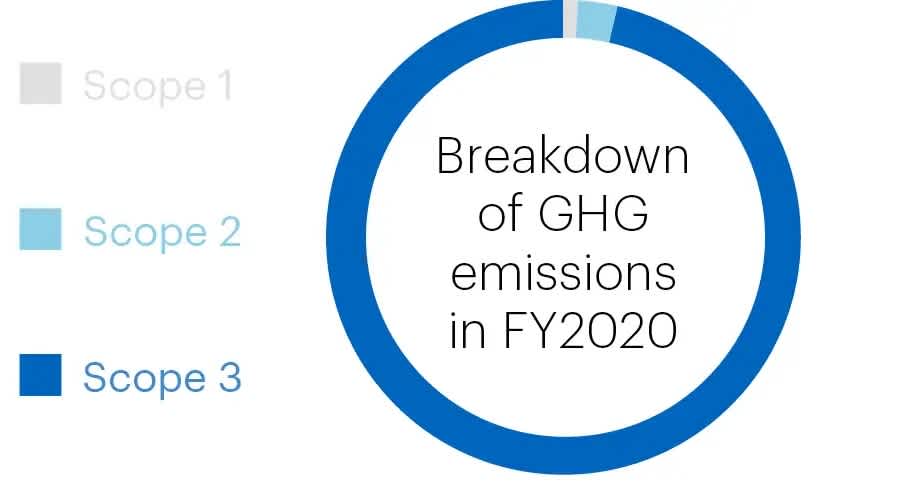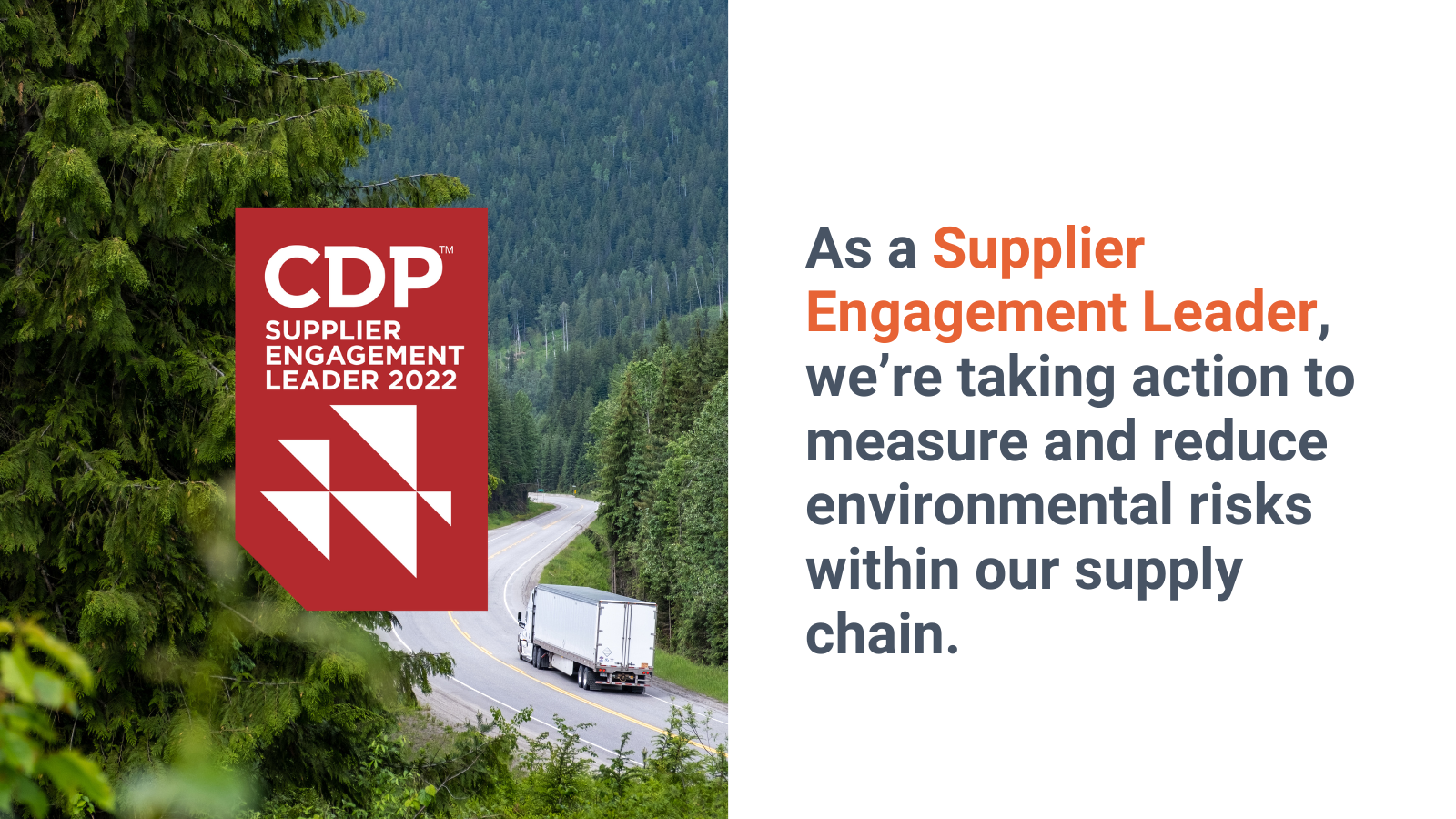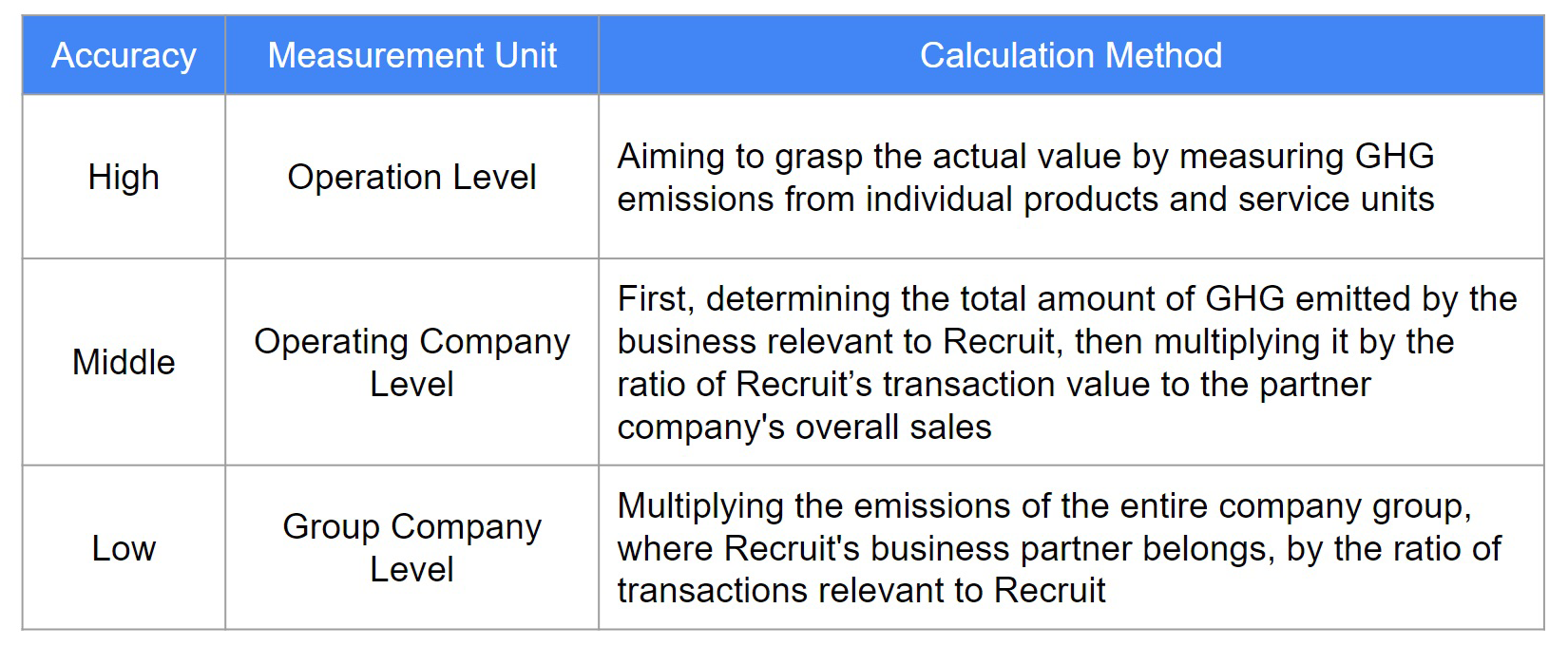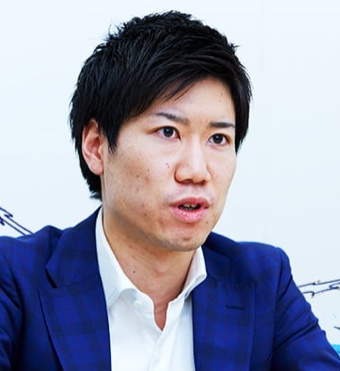More than 90% of the Recruit Group's greenhouse gas (GHG) emissions come from its value chains other than its business activities (Scope 3). To reduce this, Recruit Co., Ltd. is actively engaging with its suppliers and pursuing strategic initiatives to reduce emissions in Japan. Due to these decarbonization efforts, Recruit Group was selected as a CDP Supplier Engagement Leader for two consecutive years, which is a recognition awarded to only the top 8% of companies worldwide. In honor of Earth Day, read on to learn more about Recruit’s efforts to reduce emissions in Japan.
Reaching for Decarbonization Through Strong Supplier Engagement
As a service provider, Recruit Group's carbon footprint from its business activities (Scope 1 and 2) account for only less than 10% of its total GHG emissions, and it is expected to achieve carbon neutrality in Scope 1 and 2 for FY2021*1. In order to meet Recruit Group's goal of achieving carbon neutrality in greenhouse gas emissions (GHG) across its entire value chain by fiscal year 2030, it is essential to collaborate with the suppliers that support Recruit Group’s business activities.

More than 90% of the Recruit Group’s GHG emissions came from Scope 3 in FY2020
Recruit Group has set a three-year target starting in fiscal year 2022 to accelerate its efforts and has been working with suppliers to implement more substantial measures, which is in line with the science-based 1.5℃ pathway aiming to limit global temperature rise within this range compared to the temperature before the Industrial Revolution*2.
In both 2021 and 2022, Recruit Group was selected as a Supplier Engagement Leader by CDP, the world's largest climate change rating organization. CDP recognizes only the top 8% of companies in the world that effectively engage their suppliers on climate change issues (653 companies total in 2022, including 131 Japanese companies). Among all the initiatives of Recruit Group, the Japan division’s proactive collaboration efforts were highly evaluated. Even in Japan, where the number of companies measuring GHG emissions in Scope 3 remains small, Recruit is taking a progressive approach to provide know-how and assistance to its suppliers in measuring and reducing overall GHG emissions.

*1 GHG emissions throughout business activities are the sum of Scope 1 and 2. Carbon neutrality includes reducing GHG emissions as well as offsetting the remaining emissions. The Company will have obtained its FY2021 goal of carbon neutral assurance throughout its business activities upon completion of the following steps: Conducted measurement of FY2021 GHG emissions, obtained an accredited third-party assurance on the amount by April 2023, and offsetting of those emissions.
*2 The GHG emission reduction target established in line with the science- based decarbonizing level of limiting global temperature rise to 1.5℃ compared to the temperature before the Industrial Revolution, which was reported by the Intergovernmental Panel on Climate Change (IPCC).
Recruit Becomes One of a Handful of Nonmanufacturing Companies “Refining” Scope 3 Data
Recruit is currently refining measurement standards for the 2022 Scope 3 GHG emission data together with partner companies. This is the first step in identifying GHG emission sources and leading to effective reduction measures.
Currently, many companies in Japan calculate their Scope 3 GHG emissions with a simplified formula; multiplying the amounts for each expense account, including outsourcing expenses and advertising and promotion expenses, by versatile emission factors disclosed by the Ministry of the Environment and other public institutions. Kei Yamanishi, who is in charge of the GHG Reduction Strategy Project at Recruit's Sustainability Promotion Office, said, "If we follow this calculation formula, there is the possibility that the emissions of our business partners may be overestimated, or the GHG reduction efforts of business partners that do not appear in their accounts. The only way to reduce emissions is to reduce transactions with business partners, and I feel that it is difficult to achieve both business growth and environmental promotion.” Kei explained how he came to focus on measuring data in this way: “Most of the emission factors for each industry have not changed for about 10 years in Japan, so there is a large discrepancy with the actual situation, especially when applied to suppliers that are taking advanced approaches. Although I knew it was a difficult challenge, I thought that we should work on measuring emissions for each partner company; in other words, refining."
However, the status of environmental efforts of each partner company varies, and not all of the partners are equally able to capture the actual measurement values. Although capturing exact figures is recommended internationally, Recruit is one of the first companies in the Japanese media industry to implement this standard.
One of the first business partners that came on board to support Recruit’s initiative is NTT DATA Corporation (NTT DATA). Toru Shimogaki, manager of the Green Innovation Promotion Office, Sustainability Management Promotion Department at NTT DATA, recalls, "At the start of our partnership, we proposed refinement steps based on the knowledge gained through discussions with other partner companies and on the trends in global rulemaking.” NTT DATA’s knowledge bank has helped Recruit accelerate its own decarbonization efforts.
Recruit is currently partnering with about 30 suppliers, starting by identifying emission sources. Kei’s team meets with each business partner, and works with them to determine what calculation method is best suited to the situation of each company rather than pushing a one-size-fits-all solution. The reactions have been positive, with one supplier sharing, "We were struggling to balance business expansion and GHG reduction, so we are grateful that Recruit is leading the effort.” Another supplier shared, “We would like to cooperate in creating rules for calculating emissions and supporting environmental activities of small and medium-sized enterprises, and together lead environmental efforts in Japan."
Kei also commented, "When we first proposed the idea of refining measurement internally, there were some concerns about the negative impact on our businesses. However, we were able to create a scheme that has a small impact on our business, promotes engagement with our suppliers, and benefits the businesses of both suppliers and Recruit. With other advanced companies, we share a medium- to long-term vision and have continued discussion on GHG emission measurement and refining.

Recruit applies one of the three calculation methods according to the situation of each business partner
Accelerating Japan's Decarbonization Through Collaboration
One of the positive dynamics of GHG emissions in the value chain is that the overall scale of carbon reduction can be greatly accelerated when multiple companies collaborate with each other. Kei said, "In Japan, there is an imbalance of information on decarbonization. Recruit is to contribute to correcting this through actively involving more companies and sharing know-how with them." Toru Shimogaki of NTT DATA added, "In the future, I would like to increase the number of companies strategically aiming for decarbonization, just like Recruit. To continuously reduce Scope 3 emissions, creating rules for calculating and exchanging emissions is a must, so I would like to promote decarbonization initiatives through rulemaking with Recruit. We also expect Recruit to lead the decarbonization efforts because its businesses are deeply rooted in people's lives in various fields such as travel, dining, beauty, and housing.”
In addition, Recruit Group is planning to join the Green Software Foundation*3, an international non-profit organization, in which NTT DATA shares knowledge and creates calculation rules for the ICT industry as a steering member*4. Recruit Group supports the realization of a decarbonized society by participating in the discussion of international calculation rules, as well as Japanese rulemaking in line with this international momentum towards reducing GHG emissions.
*3 A non-profit organization with the mission to create a trusted ecosystem of people, standards, tooling, and best practices for building green software.
*4 Its U.S. subsidiary Indeed, Inc. is to join on behalf.

Kei Yamanishi
GHG Reduction Strategy Project, Sustainability Promotion Office, Recruit Co., Ltd.
Kei joined Recruit Career Co., Ltd. in April 2016 and worked as a career advisor for engineers in the manufacturing and IT industries. In April 2021, he transferred to the Sustainability Promotion Office to support environmental promotion activities for Recruit. Before joining Recruit, he worked in corporate sales in the banking industry with a focus on manufacturing and real estate.